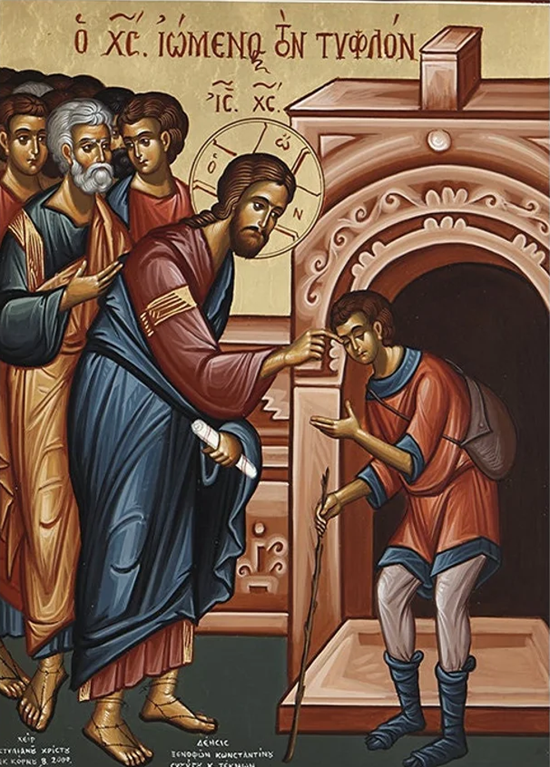What Do You Want?
Thirtieth Sunday Scripture Readings

“What do you want me to do for you?” That’s the question, isn’t it? In last week’s gospel reading, James and John called out to Jesus for a favor. What was it they wanted? Nothing less than the places of honor in the Reign of God, presided over by the eschatological Son of Man, with prestige and power. What they received was quite different: a call to humility, to share not only in Christ’s mission of service but also to drink of his cup of woes and to drown in his pool of sorrows. Not that woes and sorrows should be seen as the price of taking one’s place in the Reign of God, but that entry into the Kingdom is no inoculation against the troubles and sufferings of this life. Jesus asked them what they wanted, and they told him. He answered them, but the nature of the gift they asked for was entirely different from what they thought it was.
Contrast that exchange with the one described in today’s gospel reading, which, incidentally, follows right after it in Mark’s text, providing us with a deliberate contrast. Blind Bartimaeus calls out to Jesus, shouting, “Son of David, have pity on me.” That title, Son of David, was a messianic title, referring to the prophecy of Nathan when he told King David that God said, “… I will raise up your offspring to succeed you, your own flesh and blood, and I will establish his kingdom. … Your house and your kingdom will endure forever before me; your throne will be established forever.” [2 Samuel 17:12, 16] Without even being able to see Jesus, Bartimeus calls him “Son of David” not only because Jesus was “of the house and lineage of David,” [Luke 2:4] but because the man recognized Jesus as the anointed king from Nathan’s prophecy. In this, we see the blind man’s faith, his trust in the fulfillment of God’s promise.
The contrast between James and John and Bartimaeus could hardly be greater. James and John were healthy and in the prime of their lives, rugged fishermen. They’d been schooled in the ways of God and their faith not only as Jesus’s disciples but as members of Christ’s inner circle—Peter, James, and John—whom Jesus had brought with him to all the most significant moments of his ministry. Bartimaeus, on the other hand, was a blind beggar. There wasn’t any “safety net” back then that disabled people could count on to survive. If their families were unable to care for them, they had little choice but to beg for their subsistence.
When Jesus asked Bartimaeus, “What do you want me to do for you?” He responded, not with a request for prestige or power, nor even necessarily a miracle cure for his blindness. What he asked for was nothing less than to be given the opportunity to live a fruitful and productive life. By asking to see, he asked to be freed from the constraints that held him back from becoming the person his heart yearned to be. He asked Jesus to give him a chance … simply that. Somehow, despite all his limitations, he knew that Jesus was the one who could accomplish that for him. “Go your way,” Jesus told him, “your faith has saved you.” It’s not unthinkable that his “way” might have been the way of discipleship.
You and I are not physically blind like Bartimaeus, but there are many kinds of blindness. Remember when the Pharisees said to Jesus, “Surely, we are not also blind, are we?” And Jesus told them, “If you were blind, you would have no sin, but now you are saying ‘We see,’ so your sin remains.” [John 9:40-41] That “sin” that Jesus was talking about isn’t the kind of sins we generally think of. It wasn’t killing, lying, stealing, or committing adultery. He was referring, rather, to our character defects that cause us to be fearful, selfish, unkind, and ungenerous. Defects that we refuse to address or even consider dealing with. Like Bartimaeus, it’s our blindness to these pet attitudes, habits, and beliefs that keep us from living our lives to the fullest.
In some ways, Bartimaeus was fortunate. He knew he was blind. He could pinpoint and describe the factor that was holding him back in life. Could we do the same? Could we identify our own spiritual blindness and recognize how it limits our serenity, our peace, our joy, and our ability to connect with others? Who wouldn’t expend the effort to correct their shortcomings, if they could only recognize them? Why would anyone continue to make themselves and those around them miserable if they could possibly help it? Yet, one unfortunate characteristic of spiritual blindness is that it doesn’t recognize itself. It’s like a disease whose symptom is the belief that there is no disease. Like the Pharisees I mentioned, it thinks it can see and that the troubles dogging it are all other people’s fault.
The fact that you’re present here with me now tells me one thing: like Bartimaeus, you have faith. You trust that the God you believe in cares about you. Just the fact that you’re here is like crying out, “Jesus, Son of David, have pity on me because something is holding me back from becoming the person I so desire to be, and I don’t know what it is, and I don’t know what to do about it.” Since you trust in God that much, he’s reaching back out to you, saying, “What do you want me to do for you?” You might try using the Bartimaeus method because fixing what’s wrong is so much easier than identifying it. You might just want to use his prayer saying, “Master, I want to see.”
Get articles from H. Les Brown delivered to your email inbox.
